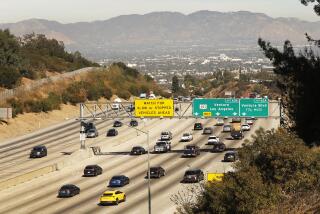LOST? : Even at Home, Some People Can’t Stay on Right Track
- Share via
It happens to all of us.
Getting lost, being lost, or, as some prefer to express it, “temporarily misoriented.”
Usually it’s only a momentary loss of geographic orientation, of simply not knowing where you are in today’s tangle of city streets and interstate highways, mammoth, multilevel shopping malls and labyrinthine new buildings.
But sometimes it can be serious. “Angry Paramedics Eject Lost Ambulance Driver,” a newspaper headline reported earlier this year. The driver was kicked out of the ambulance after he got lost on the way to the hospital, taking a heart patient on a zigzag path through southeast Washington for about 10 minutes.
Why do some people get hopelessly lost, even in their own hometown, even with the aid of maps, directions and familiar landmarks?
Learn to Read Cues
Why do others have little trouble getting around, even in strange towns and, if dropped in unfamiliar territory, easily find their way home?
Is a sense of direction innate--a sixth sense?
“It’s a learned skill. It involves reading environmental cues. It’s something everyone can do,” says geographer Roger M. Downs of Pennsylvania State University.
But abilities vary. “People who have trouble with way-finding,” Downs said, “can’t relate three essential elements: self, a map or set of directions or memory of a previous visit and space, the surroundings in which they actually find themselves.”
Those who feel inept, he says, are simply not put in situations often enough to practice this skill and gain confidence.
“Navigation uses so many bits of information that have to be integrated. People who are habitually poor navigators fail in one or more parts of the process,” says zoologist R. Robin Baker of the University of Manchester in England. Baker is an expert on animal and human navigation.
“They may fail in taking in information, storing it--the brain’s map-storage area may be faulty--or in translating it back for use. There’s no neat explanation.”
Spatial Metaphors
“How we think influences how we find our way around,” explains Jeremy Crampton, a doctoral student at Penn State, whose research combines cognitive psychology and geography.
“People who get lost haven’t managed to develop their spatial metaphors sufficiently,” he theorized in a paper presented at this year’s meeting of the Assn. of American Geographers. Spatial metaphors use progress along a path to express progress in personal or career goals, such as “start out to make a fortune” or “midpoint of a career.”
Comparing experts and novices at way-finding, Crampton found experts concentrate on choosing correct routes, monitoring their progress and developing error-prevention strategies. “They have a sense of distance, that they’ve gone too far or that the terrain doesn’t match what it should be,” he explains. “If they get lost, they recover by mentally retracing their steps.” Novices don’t.
“Some people just never pay attention to where they are. Others always want to get their bearings, whether in a new city or a new building,” says Robin Shannonhouse, executive director of the U.S. Orienteering Federation. Orienteers make a sport of way-finding by competing to follow a course, usually through a forest, using only a topographical map and a compass.
“If you can find your way out of the woods alone, you can find your way anywhere,” Shannonhouse says. “The most experienced develop a built-in radar. Give orienteers a street map and circle the destination, and you don’t have to give them directions.”
She says that whenever she goes to a new city, she immediately gets a map to see where the interstate comes in. “I orient myself to it. No matter what part of the city I’m in, I know where I am.”
Homing Device
Everyone probably has a favorite homing device. A Denver native says he always references himself to the Rockies--they’re west. A resident of Toledo, Ohio, uses Lake Erie--it’s north.
A lifelong Washingtonian with a poor sense of direction says, “All I have to do is find the Washington Monument and I can get home. Once I took the wrong bridge home from Virginia and wound up lost. I asked for directions to the monument, even though I knew I would probably be going out of my way.”
She and several others who habitually get lost say they have a general lack of awareness of their surroundings. Once turned around, they can’t reorient themselves easily. What is automatic for many is an all-consuming effort for them.
More to Read
Sign up for Essential California
The most important California stories and recommendations in your inbox every morning.
You may occasionally receive promotional content from the Los Angeles Times.












